Rugby sevens
Rugby sevens (commonly known as simply sevens), and originally known as seven-a-side rugby, is a variant of rugby union in which teams are made up of seven players playing seven minute halves, instead of the usual 15 players playing 40 minute halves. Rugby sevens is administered by World Rugby, the body responsible for rugby union worldwide. The game is popular at all levels, with amateur and club tournaments generally held in the summer months. Sevens is one of the most well distributed forms of rugby, and is popular in parts of Africa, Asia, Europe, and the Americas, and especially in the South Pacific.[2]
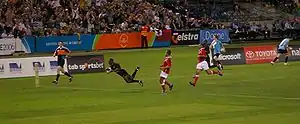 | |
| Highest governing body | World Rugby |
|---|---|
| Nicknames | Sevens, 7s, VIIs, Seven-a-side[1] |
| First played | 1883 |
| Characteristics | |
| Contact | Full |
| Team members | 7 |
| Mixed gender | Separate competitions |
| Type | Outdoor team sport, variant of rugby union |
| Equipment | Rugby ball |
| Presence | |
| Olympic | 2016 onwards |
| World Games | 2001 – 2013 |
Rugby sevens originated in Melrose, Scotland in the 1880s; the Melrose Sevens tournament is still played annually. The popularity of rugby sevens increased further with the development of the Hong Kong Sevens in the 1970s and was later followed by the inclusion of the sport into the Commonwealth Games for the first time in 1998 and the establishment of the annual World Rugby Sevens Series in 1999 and the World Rugby Women's Sevens Series in 2012. In 2016, rugby sevens was contested in the Summer Olympics for the first time. It has also been played in regional events such as the Pan American Games and the Asian Games, and in 2018 a women's tournament was played for the first time at the Commonwealth Games.
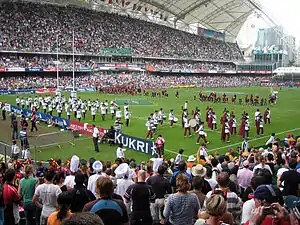
Overview
Rugby sevens is sanctioned by World Rugby, and is played under similar laws (with exceptions noted below) and on a field of the same dimensions as the 15 player game. While a regular rugby union match lasts at least 80 minutes, a normal sevens match consists of two halves of seven minutes with a two-minute half-time break. Previously, the final of a competition could be played over two halves of ten minutes each,[3] but beginning in 2017, final-round matches were limited to seven-minute halves[4] (excluding ties) in an effort to reduce injuries. Sevens scores are generally comparable to regular rugby scores, but scoring occurs much more frequently in sevens, since the defenders are more spaced out. The scoring system is the same as regular rugby union, namely five points for a try, three points for a drop goal (whether from penalty or open play) and two points for a post-try conversion.[5]
The shorter match length allows rugby sevens tournaments to be completed in a day or a weekend. Many sevens tournaments have a competition for a cup, a plate, a bowl, and a shield, allowing many teams of different standards to avoid leaving empty-handed.
Sevens tournaments are traditionally known for having more of a relaxed atmosphere than fifteen-a-side games, and are often known as "festivals". Sevens tournaments gained their "popularity as an end of season diversion from the dourer and sterner stuff that provides the bulk of a normal season's watching."[6] Fans frequently attend in fancy dress, and entertainment is put on for them.
The Hong Kong Sevens tournament has been especially important in popularising the game in Asia, and rugby sevens has been important as a form of international rugby "evangelism"; hence it is perhaps the most widely played form of the game, with tournaments in places as far apart as Bogota and Bangkok, Kuala Lumpur and Kenya, Singapore and Scandinavia, as well as the countries in which rugby union is well known.[7]
Rules
Sevens is played on a standard rugby union playing field. The field measures up to 100 metres (330 ft) long and 70 metres (230 ft) wide.[8][9] On each goal line are H-shaped goal posts. The goal posts are on the goal line. This is unlike American football in which the posts are behind the back of the goal line.
Variations to the laws of the game
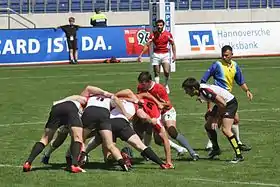
There are several variations in laws which apply to rugby sevens,[10][11] primarily to speed up the game and to account for the reduced number of players. The main changes can be summarised as follows:
- 7 players per team on field (instead of 15).
- Five substitutes, with five interchanges (instead of 8).
- Seven minute halves (instead of 40-minute halves, in fifteen-a-side).
- Maximum of two minutes half-time (instead of ten minutes).
- Matches drawn after regulation are continued into golden point extra time, in multiple 5-minute periods.
- All conversion attempts must be drop-kicked (instead of having the option to place-kick).
- Conversions must be taken within 30 seconds of scoring a try (instead of 90 seconds). Prior to 2016, the limit had been 40 seconds.
- Three player scrums (instead of eight players).
- Kick-offs: in sevens, the team which has just scored kicks off, rather than the conceding team, as in fifteen-a-side.
- Yellow cards net a 2-minute suspension (instead of 10 minutes) to the offender.
- Referees decide on advantage quickly (where one play usually ends advantage, unlike in fifteens).
- In major competitions, there are additional officials present (in-goal touch judges) to judge success of kicks at goals, which means the game is not delayed waiting for touch judges to move into position to judge conversion attempts.
Gameplay
Positions and gameplay
Teams are composed of seven players — three forwards and four backs.[12] Scrums are made up of three players from each team. The chart below shows a team's typical formation at scrum time, with three forwards bound into the scrum, a scrum-half waiting to retrieve the ball once it exits the scrum, and three backs positioned to receive a pass. The numbers shown here are for illustrative purposes only. Unlike rugby fifteens, where a player's number corresponds to his position, numbering in rugby sevens is more flexible. In a squad of twelve players, the players will be numbered one through twelve. The starting players can have any of the twelve numbers, not necessarily one through sevens. No set numbers differentiate positions; for example, numbers one through three are not reserved for forwards, but can be worn by any squad player.
|
|
In open play, a typical defensive formation involves a line of six defenders, with one sweeper behind the line.[13] With the attacking team using all seven players against the defending team's six in the line, the attacking team often attempts to move the ball to create an overload.[14] The defensive line can be put under pressure if the defending team makes a tackle and commits players to the ruck; with fewer players in the defending line, it leaves more space for the attacking team to exploit.[15]
Pace of the game
Rugby sevens tends to be played at a faster pace than rugby fifteens. Because of the faster nature of the game, sevens players are often backs or loose forwards in fifteens rugby. The differences are most notable on game restarts. Because scrums in sevens involve three players forming one row instead of eight players forming three rows, scrums tend to assemble more quickly, require fewer restarts, and the ball exits the scrum more quickly.[16][17] Penalties in sevens are generally taken with a quick tap, instead of a kick for touch and a line out, resulting in the ball being put back in play more quickly.[18] When a player is tackled and a ruck is formed, the ball tends to exit the ruck more quickly, as the attacking team generally has only three players involved in the ruck — the tackled player, one support player, and one scrum-half.[19]
History
England
Short sided or handed games began with a six-a-side tournament in Huddersfield in September 1879, played under regular rules but with 10 minute halves. Other tournaments were played over the next few years across the North before being replaced by a nine-a-side game. Matches attracted large crowds and raised thousands to support the clubs or local hospital charities. In August 1890, Yorkshire suspended 8 teams and in September Lancashire banned games with less than 15-a-side over allegations of professionalism; short sided games effectively ended in England.[20]
Scotland

Rugby sevens was initially conceived in 1883 by Ned Haig and David Sanderson, who were butchers from Melrose, Scotland as a fund-raising event for their local club, Melrose RFC. The first-ever sevens match was played at The Greenyards, the Melrose ground, where it was well received. Two years later, Tynedale was the first non-Scottish club to win one of the Borders Sevens titles at Gala in 1885.[21]
Rugby union sevens' popularity in the Borders spread north throughout Scotland:-[22] Aberdeen hosting Sevens in 1889;[23] Edinburgh hosting Sevens in 1896;[24] Glasgow hosting Sevens in 1898;[25] Dundee hosting Sevens in 1901.[26] The popularity of Sevens exploded in the 1920s and 1930s.[27] From the 19th century to today, over 150 Sevens tournaments in Scotland are known; and though some tournaments have folded; new tournaments continue to be born.[28]
Sevens remain popular in Scotland; and the Melrose Sevens annually attracts around 12,000 spectators to the small Borders town.[29] The Melrose Sevens centenary tournament in 1983 attracted 17,500 fans.[30]
England
A rugby sevens match was played in Chorley, Lancashire as part of the Chorley Rugby and Athletic club's sports day on 22 July 1888; another match looks to have taken place the following year on 24 August 1889. Sevens then ended in England and it would be a long wait for any English Sevens tournaments to arrive.[31]
For a long time the English Rugby Union held against rugby sevens being played in England. English clubs, particularly those close to the Scottish border and aware of the game's success in Scotland, wanted to play their own tournaments. Their pleas went in vain.[31]
England finally hosted its first Sevens tournament in 1921 as the Scottish game crept south over the border. This was on 23 April 1921 by Carlisle rugby club; they beat a Hawick 'B' side in the final.[32] Next was on 3 September 1921[33] in north east England at the Percy Park Sevens in North Shields.[21] It was close to the Scottish Borders and Scottish sides were invited to play in the tournament with local English sides. The final was contested between Selkirk and Melrose; with Selkirk winning the event.[21]
First played in 1926, the Middlesex Sevens were set-up by Dr J.A. Russell-Cargill, a London-based Scot.[21] The tournament was intended as a fundraiser for King Edward VII Hospital. It raised £1,600; at a time when standard admission was a shilling, and stand seats cost five shillings.[27] This became England's premier Sevens tournament:- it had some formidable figures on its sub-committee such as Wavell Wakefield and Bill Ramsay;[27] it was close to London - and 10,000 spectators attended the second Middlesex tournament; and it helped rugby in London develop - featuring the aforementioned Wavell Wakefield, Carl Aarvold (later Recorder of the City of London) of Blackheath FC, Wick Powell of London Welsh RFC, and John Tallent, who would later become chairman of the Four Home Unions Tours Committee.[27] Invitation sides graced the Sevens tournament:- such as Sale RFC in 1936, which included such players as Wilf Wooller and Claude Davey of Wales and Ken Fyfe[34] of Scotland amongst their backs; and in 1939, Cardiff RFC, which included players such as Wilf Wooller again, and Les Spence and Wendy Davis.[35][27]
New Zealand
Sevens then spread from Scotland to Dunedin; a Scottish expatriate city in New Zealand.[36] The first Dunedin Sevens tournament was the Charity tournament in aid of Dunedin hospital on 28 September 1889.[22] From Dunedin, sevens spread north to Christchurch where Canterbury Rugby Union held a Sevens tournament on 16 September 1893.[22] On 23 May 1894, sevens had almost reached the North Island with a tournament in Nelson.[22]
Australia
The first notice of a Sevens tournament in Australia is that of Central Queensland Rugby Union's tournament in Rockhampton on 4 July 1891. The Wanderers won the tournament beating the Waratahs and the Berserkers.[37]
Ireland
In Ireland, Douglas RFC of Cork attempted to host a Sevens tournament on 8 December 1900. However, due to inclement weather this did not come off. The first Sevens tournament in Ireland was then the Belfast tournament of 30 April 1921 in aid of the Warriors Day fund. This was run by the northern branch of the IRFU.[38]
Argentina
The next country to host a Sevens tournament was Argentina; arriving again via Scottish expatriates.[39] The Buenos Aires Cricket & Rugby Club hosted their own Sevens event on 9 July 1921. The Buenos Aires club defeated Belgrano Athletic Club in the final. The Buenos Aires club went on to host Sevens tournaments on the 9 July every year; however a pitch-invasion tradition at the final meant that no further winners were recorded until 1937.[40][41] The 9 July is Argentina's Independence Day holiday; and a feast is often prepared in celebration. It is said that the pitch invasion tradition started when a bell, announcing that food was ready, rang out during the final.[39]
First international tournament
The first-ever officially sanctioned tournament for national teams was the 1973 International Seven-A-Side Tournament held at Murrayfield as part of the "Scottish Rugby Union's Celebration of Rugby" centenary celebrations.
Hong Kong Sevens
Due to the success of the format, the Scottish connection continued in the establishment of the Hong Kong Sevens in the 1970s. Founded largely by expats such as "Tokkie" Smith. the Hong Kong Sevens were ahead of their time and an influential force in the modernisation of rugby union. For example, the Hong Kong Sevens were one of the first rugby union tournaments to attract major sponsorship when the airline Cathay Pacific sponsored the inaugural tournament in 1976. They also provided a level of cosmopolitan international competition, which tended not to exist in rugby before the first Rugby World Cup in 1987, especially since was not seen as one of the "Big Eight". By 1986, the Hong Kong Sevens were held up as a positive example to others, although many of the smaller nations' teams were largely made up of expatriates.
The Scottish connection continued in the establishment of the Hong Kong Sevens in the 1970s, founded largely by expats such as "Tokkie" Smith, and in England, London Scottish RFC was strongly involved in the Middlesex Sevens from the start. The Hong Kong Sevens were ahead of their time and an influential force in the modernisation of rugby union. For example, the Hong Kong Sevens were one of the first rugby union tournaments to attract major sponsorship when the airline Cathay Pacific sponsored the inaugural tournament in 1976.[42] They also provided a level of cosmopolitan international competition, which tended not to exist in rugby before the first Rugby World Cup in 1987,[43] especially since Hong Kong was not seen as one of the "Big Eight". By 1986, the Hong Kong Sevens were held up as a positive example to others, although many of the smaller nations' teams were largely made up of expatriates.[43][44]
World Cup
The Rugby World Cup Sevens, in which the Melrose Cup is contested, was launched in 1993.
International development
Rugby sevens continues to be popular in the Scottish Borders, where the ten most prestigious tournaments make up a league competition known as the Kings of the Sevens.[45] In honour of the role of Melrose RFC in the creation of rugby sevens, the club was inducted, along with Haig, to the IRB Hall of Fame in 2008.[46] Top club sides and international sides frequently enter the Sevens tournaments in Scotland; the Melrose Sevens, as the founding event of the sport, being the most prestigious.[47]
Sevens has also taken strong root in the Pacific island nations of Fiji, Tonga, and Samoa, as well as in Kenya. In many minor rugby nations, such as in Poland, development has tended to concentrate on rugby sevens as a means of introducing the sport to people.[48] Rugby sevens has become popular in places such as Hong Kong, Singapore and Dubai, which are not so successful in the fifteen-a-side code. In addition, seven of the 15 current "core teams" that compete in all legs of the World Series represent nations that are not within the recognised top tier of the 15-man game — Fiji, Samoa, Kenya, the United States, Canada, Portugal, and Japan. Recently there has been the introduction of many new teams to the sevens circuit such as Ireland, Russia, and Germany.
Rugby league sevens
Rugby league also has a long heritage in the seven a side game. The world record rugby league crowd for sevens was 80,000 in Roundhay Park, Leeds, 1932, before a royal sudience.
Major tournaments


World Rugby Sevens Series
The World Series has been held every season since the 1999–2000 inaugural season. Each season the Sevens Series holds from seven to eleven tournaments, from around October and concluding around June. Most tournaments see 16 teams competing — mostly "core teams" that participate in each event, but also some teams that win the right to participate in select events.
New Zealand has been the dominant force in the Sevens Series, winning 12 out of the 18 seasons, including the first six seasons from 1999–2000 to 2004–05. In recent years, however, several other teams have challenged New Zealand's dominance. Fiji won the Series in 2005–06 and again in 2014–15 and 2015–16; South Africa won in 2008–09 and 2016–17; and Samoa claimed the 2009–10 crown. Other strong contenders include England and Australia, each of whom have had several top four finishes in recent seasons.[49] The 2015 London Sevens, saw the United States win their first-ever tournament in the World Series.[50]
Notable World Series players include England's Dan Norton, who has scored more tries (>230) than any other player; and England's Ben Gollings, who has scored more points (2,652) than any other player.
World Rugby Women's Sevens Series
The Rugby Women's Sevens Series has been held every season since the 2012-13 inaugural season. Each season the Sevens Series holds from five to six tournaments, usually starting around November and concluding around June. Most tournaments see 12 teams competing — mostly "core teams" that participate in each event, but also some teams that win the right to participate in select events.
New Zealand have been the most dominant team in the series since its establishment by winning four of the six competitions held up to and including 2018.
Summer Olympics
The International Olympic Committee voted in 2009 to include rugby sevens on the program for the 2016 Olympic Games in Rio de Janeiro, Brazil.[51] There were two open spots for sports and initially seven sports began the bidding for inclusion in the 2016 program. The event debuted in an Olympic program at the 2014 Summer Youth Olympics.
Two issues related to differences between the structures of rugby union and the Olympics were sorted out before the 2016 Olympic Games. The issue of a combined British team has proven less of a problem in rugby union. World Rugby chief executive Mike Miller endorsed the concept of a combined British sevens team in 2011 for the 2016 Olympics and beyond.[52] Another issue is the status of Northern Ireland. World Rugby recognises the Irish Rugby Football Union as the sport's governing body for the entire island of Ireland. By contrast, the International Olympic Committee recognises the British Olympic Association as the governing body of the UK Olympic team, while the Olympic Council of Ireland usually fields teams representing all of Ireland in sports which are organised on an all-Ireland basis. Northern Irish sevens players play for the Irish team.[53][54]
In the men's competition Fiji won the gold medal in the sport's Olympic debut, with Great Britain taking the silver and South Africa the bronze. The women's gold medal was won by Australia, with New Zealand taking silver and Canada bronze.[55]
World Cup Sevens
The Rugby World Cup Sevens is held every four years and is the premier international rugby sevens tournament outside of the Olympic Games. The first tournament was held at Murrayfield in 1993 with England becoming the first team to win the event. Fiji and New Zealand are the most successful, with Fiji winning two World Cups and New Zealand winning three World Cups. In the men's competition teams compete for the Melrose Cup and in the women's competition, launched in 2009, teams compete for the Women's Rugby World Cup Sevens Trophy.
Beginning with the 2018 edition, which was held in San Francisco, United States, the World Cup Sevens is held in the middle of the Summer Olympic cycle, two years after each Olympics.
Commonwealth Games
Rugby sevens has been played at each of the Commonwealth Games every four years since its first appearance at the 1998 Commonwealth Games in Kuala Lumpur, Malaysia and was the first major international multisports event to include the sport. Rugby sevens is a "Core" sport by the Commonwealth Games Federation, necessitating its appearance at all future games. The New Zealand team has won the gold medal four times with South Africa winning the tournament at Glasgow 2014 beating the defending champions in the final. Through the 2014 Games in Glasgow, it was the last remaining male-only sport at the Commonwealth Games, after women's boxing was added for those Games. Women's sevens made its Commonwealth Games debut in the 2018 Games. The New Zealand teams won the gold medal in both the men's and women's competitions.
Regional tournaments
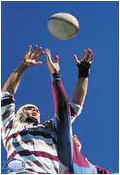
Rugby sevens is played at various regional multi-sport competitions, including the Asian Games and the Pacific Games. Rugby union was formerly played at the World Games, but this has ceased as rugby is now an Olympic sport.
Pan American Games
Men's rugby sevens at the Pan American Games has been held every four years since the 2011 Pan American Games, with Canada, Argentina, and the United States placing for medals each time.[56] Women's rugby sevens was later added to the program for the 2015 Pan American Games.[57]
European Sevens Championship
The Rugby Europe Sevens Grand Prix Series serves as a regional qualifier for two types of tournaments. The top two finishing teams each year who are not core members of the World Rugby Sevens Series advance to the Hong Kong Sevens, the qualifying tournament for teams vying to achieve core team status in the World Rugby Sevens Series. The Europe Grand Prix also serves as a regional qualifier for major quadrennial tournaments, such as the summer Olympics and the Rugby World Cup Sevens.
In Europe, Portugal dominated in sevens during the Championship era (2002–10); only twice the team did not win the trophy, in 2007 and 2009, when both times the championships were won by Russia. In the Grand Prix Series era from 2011 to the present, the champions became England and France; both teams won the trophy twice in a row. Portugal won the first edition, while Russia is the current champion.
Women's rugby sevens
Women's rugby sevens has been dominated by New Zealand, with either the New Zealand team (1999–2001) or Aotearoa Maori Women's Rugby sevens team (playing as New Zealand),[58] winning the annual Hong Kong Sevens tournament from 1997 until 2007. The United States won the Hong Kong Sevens in 2008 by defeating Canada in the final (New Zealand failed to send a team).
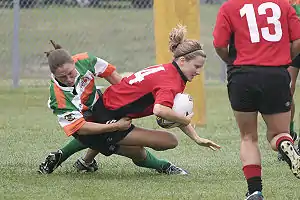
The inaugural Women's Rugby World Cup Sevens tournament took place in Dubai together with the men's tournament during the first weekend of March 2009. England defeated Canada 12–0 in the Bowl final while Australia edged New Zealand 15–10 in extra-time to become the first to win the Women's Rugby World Cup.
WR, then known as the International Rugby Board (IRB), organised its first official women's sevens tournament outside of the World Cup as part of the 2011 Dubai Sevens. This was part of a plan to launch a full IRB International Women's Sevens Series for 2012–13.[59] The international series was officially christened as the IRB Women's Sevens World Series in an IRB announcement on 4 October 2012. The series, as planned, launched for the 2012–13 season and initially featured events in Dubai, the US, China and the Netherlands.[60] Two additional events were planned for the 2013–14 series, but in the end only one of these events, in Brazil, took place. For the 2014–15 series, China dropped from the schedule, while Canada and England hosted new events. The series was rechristened for 2014–15 as the World Rugby Women's Sevens Series, following the November 2014 renaming of the IRB as World Rugby. The 2015–16 series included only five events; the England and Netherlands events were dropped and an event in France was added. The 2016–17 series returned to six events with the launch of an event in Japan.
Women's rugby sevens was included in the 2016 Olympic Games due to the IRB's successful bid to reintroduce rugby to the Summer games. Australia claimed the gold medal for the event, beating New Zealand in the final with a score of 24-17. Canada claimed the bronze medal after beating Great Britain 33-10 in the third place play-off. WR also successfully pushed for the inclusion of women's sevens in the 2018 Commonwealth Games.
Many of the Scottish Sevens club tournaments run women's events as part of their Sevens.[61][62][63][64][65][66][67][68][47][69]
Sevens vs Fifteens
As sevens has proven a commercial and competitive success, sevens is starting to become divorced from the 15-man game. Former Wales rugby union player and current pundit John Taylor wrote in 2010, stating:
[Sevens] is in danger of becoming a totally separate game. Ben Ryan, who coached both the England Sevens and the Fiji Sevens, dismisses the idea that it should be seen mainly as a development tool. A few years ago players would spend a year or two with the Sevens squad to improve their running and passing skills. Many international players refined their game on the Sevens circuit including all-time greats such as Jonah Lomu. That is happening less and less. Players have to make a choice: Do they want to concentrate on Sevens or 15s? The techniques and training required are becoming very different. Modern professional players are already pretty lean but the forwards in 15-a-side do need bulk as well. In Sevens that is not required and new training regimes are making body fat levels even lower so they are not able to transfer from one game to the other.[70]
See also
- Tag Rugby
- Beach rugby
- Touch rugby
- Rugby tens
- Rugby league sevens
- Seven-a-side football (association football)
References
Works cited
- Bath, Richard (ed.) The Complete Book of Rugby (Seven Oaks Ltd, 1997 ISBN 1-86200-013-1)
- Bath, Richard (ed.) The Scotland Rugby Miscellany (Vision Sports Publishing Ltd, 2007 ISBN 1-905326-24-6)
- Jones, J.R. Encyclopedia of Rugby Union Football (Robert Hale, London, 1976 ISBN 0-7091-5394-5)
- McLaren, Bill Talking of Rugby (1991, Stanley Paul, London ISBN 0-09-173875-X)
- Massie, Allan A Portrait of Scottish Rugby (Polygon, Edinburgh; ISBN 0-904919-84-6)
- Richards, Huw (2007). A Game for Hooligans: The History of Rugby Union. Edinburgh: Mainstream Publishing. ISBN 978-1-84596-255-5.
- Starmer-Smith, Nigel (ed) Rugby – A Way of Life, An Illustrated History of Rugby (Lennard Books, 1986 ISBN 0-7126-2662-X)
- Stubbs, Ray (2009). The Sports Book. Dorling Kindersley. ISBN 978-1-4053-3697-0.
References
- Bath, The Complete Book of Rugby, p. 29
- "The Spread of the Sevens" Archived 14 July 2011 at the Wayback Machine, Melrose Sevens official site, retrieved 25 February 2010
- "2006–07 IRB Sevens World Series Media Guide" (PDF). International Rugby Board. Archived from the original (PDF) on 3 July 2007. Retrieved 10 February 2007.
- "Big Sevens finals cut to seven minutes". Australian Rugby. Retrieved 24 April 2020.
- "Rugby 7s rules - Rugby rules for dummies". 8 September 2011.
- Jones, The Encyclopedia of Rugby Union Football (1976), p. 122.
- Bath (1997), p29.
- "Intro EN" (PDF). Archived from the original (PDF) on 16 November 2009. Retrieved 6 February 2010.
- "Intro EN" (PDF). Archived from the original (PDF) on 19 December 2011. Retrieved 6 February 2010.
- "Seven-a-side Variations: Standard Set of Variations Appropriate to the Seven-a-side Game" (PDF). International Rugby Board. Archived from the original (PDF) on 15 June 2007. Retrieved 10 February 2007.
- "Laws of the Game: Seven-a-side Variations:". World Rugby. Retrieved 4 June 2016.
- “Rugby Sevens: What to Know About This International Sport”, A Healthier Michigan, Katrina Danko, August 4, 2016.
- “10 Principles of Playing Good 7’s”, Rugby Thoughts, Billy Millard, Accessed October 17, 2016.
- "Set up your rugby sevens defence", Rugby Coach Weekly, Dan Cottrell.
- "Coaching rugby sevens", Marcus Blackburn, page 85, 2014.
- “Can't tell a scrum from a sin bin?”, Today.com, Lexi Dwyer, August 9, 2016.
- “Comparing Rugby Sevens with 15-Man Rugby”, Bleacher Report, Daniel Rey, May 15, 2015.
- “Rugby penalties in Sevens”, Rugby Coach Weekly, Dan Cottrell, Accessed October 17, 2018.
- "Situational coupling at the ruck", J.F. Barkell, 2017.
- Collins, Tony (2015). The Oval World: A Global History of Rugby. p. 62. ISBN 978-1-4088-4370-3.
- Bath, Scotland Rugby Miscellany, p82
- "Oldest Sevens tournaments in the world". 27 July 2019.
- "Aberdeen F.C. Sevens". 14 July 2019.
- "Edinburgh St. George Sevens". 21 July 2019.
- "Glasgow University Sevens". 7 June 2019.
- "Dundee HSFP Sevens". 9 June 2019.
- Starmer-Smith, p60
- "Scottish Sevens tournaments". Scottish Sevens tournaments.
- "Guest Teams announced for Melrose Sevens - EventScotland". www.eventscotland.org.
- "History of the Melrose 7s".
- "Scotland to England: the spread of Sevens". 18 August 2019.
- https://scottishsevens.sport.blog/2019/08/18/scotland-to-england-the-spread-of-sevens/
- "Register | British Newspaper Archive". www.britishnewspaperarchive.co.uk.
- "Kenneth Carmichael Fyfe". ESPN scrum.
- "William Edward Norman Davis". ESPN scrum.
- "The Scottish origins of New Zealand city Dunedin". www.scotsman.com.
- "Scotland to Australia: the spread of Sevens". 25 August 2019.
- "Scotland to Ireland: the spread of Sevens". 20 August 2019.
- "Buenos Aires Cricket & Rugby Club". 13 September 2014. Archived from the original on 13 September 2014.
- "Google Translate". translate.google.com.
- Rugby sevens is a great show - Frankie Deges, Buenos Aires Herald, 8 January 2013
- Starmer-Smith, p144
- Starmer-Smith, p142
- Starmer-Smith, p146
- "Radio Borders - All The Biggest Hits". Radio Borders.
- "IRB Hall of Fame Welcomes Five Inductees" (Press release). International Rugby Board. 23 November 2008. Retrieved 8 October 2015.
- "Melrose Sevens". 7 June 2019.
- "Archived copy". Archived from the original on 19 July 2011. Retrieved 26 July 2014.CS1 maint: archived copy as title (link) retrieved, 7 November 2009
- "Dates set for 2010/11 IRB Sevens World Series" (Press release). International Rugby Board. 1 June 2010. Archived from the original on 4 June 2010. Retrieved 2 June 2010.
- Hamilton, Tom (17 May 2015). "USA make history at Twickenham with first World Rugby Series tournament win". ESPN (US). Retrieved 17 May 2015.
- "International Board backs British Olympic sevens team". BBC Sport. 6 April 2011. Retrieved 7 April 2011.
- Gavin, Mairs (30 September 2009). "Great Britain will enter team if Rugby Sevens gets 2016 Olympic green light". Daily Telegraph.
- Staff (22 October 2010). "Ireland finally look to take Sevens seriously ahead of Rio 2016". Sportsbeat. Archived from the original on 27 July 2011.
- "Rio 2016 : 7 Rugby Men". International Olympic Committee. Retrieved 12 March 2017.
- "Rugby, racquetball added to 2011 Pan Am Games". ESPN.com. 11 July 2007.
- "Pan Am Games Tickets: Be Here for Gold-Medal History". TO2015. 18 August 2014. Archived from the original on 29 October 2014. Retrieved 28 October 2014.
- "First IRB Women's Sevens event announced" (Press release). International Rugby Board. 14 September 2011. Retrieved 30 October 2011.
- "IRB announces Women's Sevens World Series" (Press release). International Rugby Board. 4 October 2012. Archived from the original on 19 October 2014. Retrieved 4 October 2012.
- "Ayr Sevens". 7 June 2019.
- "Howe of Fife Sevens". 7 June 2019.
- "Kirkcaldy Sevens". 7 June 2019.
- "Shetland Sevens". 7 June 2019.
- "Wigtownshire Sevens". 7 June 2019.
- "Garioch Sevens". 7 June 2019.
- "Edinburgh City Sevens". 7 June 2019.
- "Mull Sevens". 8 June 2019.
- "Biggar Sevens". 10 June 2019.
- Taylor, John (29 September 2010). "Fears for sevens specialists". ESPN Scrum. Retrieved 11 October 2010.
External links
| Wikimedia Commons has media related to Rugby sevens. |
- World Rugby Sevens Series official website
- World Rugby Women's Sevens Series official website
- The RugbyRugby Guide- Coaching 7s
- Ultimate Rugby Sevens
- Rugby Sevens – History & Tournaments
- Guide to playing training and coaching sevens rugby
- 2011 Refereeing Sevens Handbook
- A Brief History of Seven a Side Rugby
- Dubai Rugby Sevens – Dubai Calendar – Dubai Events Official Listings
- The Road to Rio
Tournament sites
|
World Rugby Sevens Series
|
Other Sevens tournaments
|
